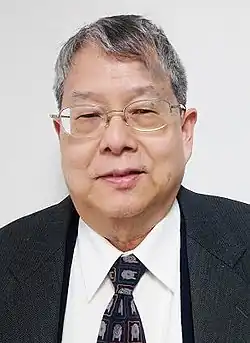Chen Shih-meng
Chen Shih-meng | |||||||
|---|---|---|---|---|---|---|---|
陳師孟 | |||||||
 | |||||||
| Member of the Control Yuan | |||||||
| In office 29 January 2018 – 31 January 2020 | |||||||
| Secretary-General to the President | |||||||
| In office 1 September 2002 – 6 February 2003 | |||||||
| Preceded by | Yu Shyi-kun | ||||||
| Succeeded by | Chiou I-jen | ||||||
| Secretary General of the Democratic Progressive Party | |||||||
| In office February 1992 – September 1992 | |||||||
| Preceded by | Chang Chun-hung | ||||||
| Succeeded by | Chiang Peng-chien | ||||||
| Personal details | |||||||
| Born | August 4, 1948 Takoma Park, Maryland, U.S. | ||||||
| Political party | Independent | ||||||
| Other political affiliations | Democratic Progressive Party | ||||||
| Education | National Taiwan University (BA) Ohio State University (PhD) | ||||||
| Profession | Economist | ||||||
| Chinese name | |||||||
| Traditional Chinese | 陳師孟 | ||||||
| Simplified Chinese | 陈师孟 | ||||||
| |||||||
Chen Shih-meng (Chinese: 陳師孟; pinyin: Chén Shīmèng; born 4 August 1948) is a Taiwanese economist and politician.[1] Chen supported the independence of Taiwan.[2]
Early life and education
Chen was born in the United States in Takoma Park, Maryland, on August 4, 1948.[3] His father was Chen Chi, a Taiwanese agronomist. His grandfather, Chen Bulei, was an official in the Nationalist government.
In 1970, Chen graduated from National Taiwan University with a Bachelor of Arts (B.A.), majoring in economics. He then pursued doctoral studies in the United States, where he earned a Master of Arts (M.A.) in economics in 1975 and his Ph.D. in economics in 1978, both from Ohio State University. His doctoral dissertation, completed under economist Edward Kane, was titled, "Theory of quantity-setting firm and risk aversion: a certainty-equivalent approach".[3]
Political career
Chen joined the Kuomintang in 1966 and quit the party in 1991, to join the Democratic Progressive Party. On 8 September 1991, Chen cofounded the 100 Action League, which called for revisions to the Article 100 of the Criminal Code.[4] In 1992, Chen joined the Goa-Seng-Lang Association For Taiwan Independence. He was Secretary General of the Democratic Progressive Party in February 1992, and held that office until September 1992.
Chen once served as vice mayor of Taipei, while Chen Shui-bian was its mayor.[5] He became the Vice-President of the Central Bank of the Republic of China in 2000. In 2002 he became Secretary General of the Office of the President of the Republic of China, a position he held until 2003. From 2003 to 2004, he was President of Ketagalan Institute. He then taught at National Taiwan University. In March 2017, Chen was nominated to the Control Yuan.[6] He was confirmed in 2018,[7] and took office on 29 January 2018.[8] Chen resigned from the Control Yuan on 16 January 2020, stating that he was unable to advocate for reform of the body during his tenure.[9] His resignation took effect on 31 January 2020.[10]
References
- ^ 曾有10億獻金?特偵傳李遠哲、陳師孟. Chinese. Chinatimes.
- ^ 陳布雷長孫陳師孟為何成了台獨大將. Chinese.
- ^ a b "Theory of quantity-setting firm and risk aversion: a certainty-equivalent approach" (PhD Thesis). Proquest. 1978. Retrieved 15 August 2025.
- ^ Han Cheung (20 July 2025). "Taiwan in Time: Zero tolerance for White Terror". Taipei Times. Retrieved 20 July 2025.
- ^ 陈师孟与“蓝色恐怖”. 2003. Huaxia. Chinese.
- ^ Yeh, Sophia; Chang, S.C.; Huang, Romulo (1 March 2017). "President Tsai nominates 11 Control Yuan members". Central News Agency. Retrieved 29 January 2018.
- ^ Lin, Sean (17 January 2018). "Control Yuan: DPP's Control Yuan nominees approved". Taipei Times. Retrieved 29 January 2018.
- ^ Chung, Li-hua (30 January 2018). "INTERVIEW: Chen eyes fair fight against 'dinosaur judges'". Taipei Times. Translated by Chin, Jonathan; Hetherington, William. Retrieved 30 January 2018.
- ^ Pan, Jason (18 January 2020). "Control Yuan member slams judiciary". Taipei Times. Retrieved 18 January 2020.
- ^ Pan, Jason (24 January 2020). "Chen Shih-meng and Chen Shui-bian meet, fueling speculation on next move". Taipei Times. Retrieved 23 January 2020.